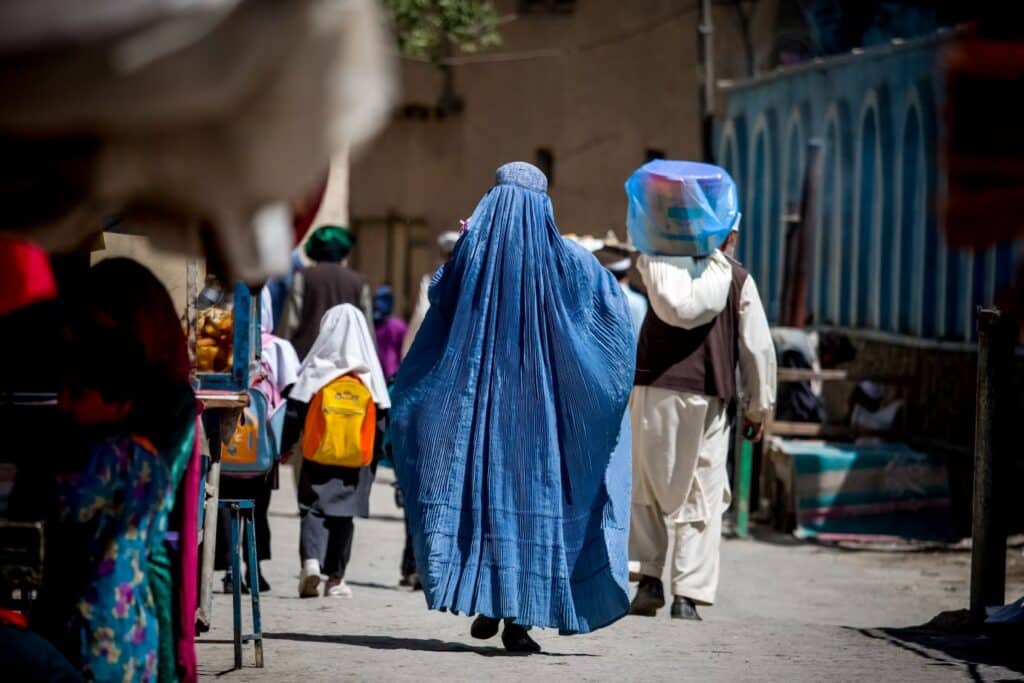Three years have passed since the Taliban took over Afghanistan, and women’s rights continue to be violently curtailed. Recently, a new law was announced banning women’s voices from being heard in public.
The new law was imposed by the Taliban’s supreme leader Haibatullah Akhundzada and gives Taliban’s morality police extraordinary powers to enforce the code of conduct against Afghanistan’s women. The law also states that women must completely cover their bodies.
“Whenever an adult woman leaves her home out of necessity, she is obliged to conceal her voice, face, and body,” the new laws mandates.
According to the Taliban government’s deputy spokesman Hamdullah Fitrat, the new edict are in accordance with Islamic Sharia law.
“The law [is] approved by the supreme leader,” he said. “Any religious scholar can check its references.”
Last week, Fitrat responded to international criticism from United Nations and the European Union which warned that the new laws could damage the possibility for future engagement with foreign nations and international organisations.
In a voice message to reporters over the weekend, Fitrat said the authorities were “committed to positive interactions with all the countries and organisations in accordance with Islamic law.”
“Interaction is the only way to achieve solutions to problems and for the progression and expansion of relations,” he said.
Yesterday, the Human Rights Watch delivered an Oral Statement at a session of the UN Human Rights Council, urging UN Rights Body to take action to advance accountability for the “ongoing grave abuses in Afghanistan.”
“Afghan women continue their brave resistance despite the grave risks, which deserves our meaningful support,” the statement read. “We need action not just words. This Council cannot carry on with business as usual.”
The UK government also made a statement, describing the latest vice and virtue edicts as “appalling.”
“They extend the already severe restrictions and systematic oppression to which Afghan women and girls have been subjected,” the statement read.
“The sound of a woman’s voice is deemed a moral violation, their bare faces are banned in public, and they are forbidden to look at men to whom they are not related. The impact on women’s wellbeing and livelihoods is unimaginable.”
The U.N rights chief Volker Türk told the U.N. Human Rights Council in Geneva that the new morality laws were outrageous and constituted systematic gender persecution.
“I shudder to think what is next for the women and girls of Afghanistan,” Türk said. “I want to make clear my abhorrence of these latest measures, which include forbidding even eye contact between women and men who are not related and imposing mandatory covering for women from head to toe, including their faces.”
UN’s social representative for Afghanistan, Roza Otunbayeva described the new laws as “intolerable restrictions” on the rights of women and girls.
“It is a distressing vision for Afghanistan’s future, where moral inspectors have discretionary powers to threaten and detain anyone based on broad and sometimes vague lists of infractions,” she said in a statement last month. “It extends the already intolerable restrictions on the rights of Afghan women and girls, with even the sound of a female voice outside the home apparently deemed a moral violation.”
Recently, the BBC spoke to women in Afghanistan, who described their existence living in perpetual fear.
“When we got out, we’re scared,” one woman said. “When we’re on the bus, we’re scared. We don’t dare to take down our masks. We even avoid speaking among ourselves, thinking that if someone from the Taliban hears us they could stop and question us.”
Another woman, an activist said: “Every moment you feel like you’re in a prison. Even breathing has become difficult here.”
Since regaining power, the Taliban have issued at least 70 decrees and directives that directly deny the autonomy and rights of women and girls.



